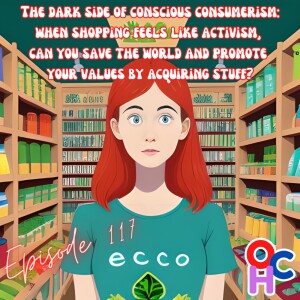
Friday Nov 10, 2023
#117 The dark side of conscious consumerism: when shopping feels like activism, can you save the world and promote your values by acquiring stuff?
I've always believed in making positive change through my purchases. Recycling, supporting local businesses, and buying eco-friendly products have been my way of feeling like I'm making a difference, saving the world one shopping trip at a time. But I had a revelation. In today's episode, I'll explore the common belief that shopping can be a form of activism, that it is positive to support or promote whatever values are important to us. The struggles of aligning hoarding tendencies with ethical and environmental values are not lost on me. I'll delve into the difficulties of ethical purchasing and provide some insights to help you navigate through the clutter.
- Expressing beliefs through items can lead to clutter
- False advertising misleads consumers with "natural" claims
- Some environmentally friendly products are more toxic
- Resource extraction required for "ethical" consumption too
- Choose green options but be mindful of unnecessary consumption
- Individual actions won't save world; collective action needed
- Systemic change
- Believing we've done our part hinders change
- Hoarders struggle with ethical purchasing decisions; advice appreciated
- Although we can make ethical shopping choices, society convinces us that spending money on stuff is a form of activism
- Supporting local businesses is beneficial, but it doesn't negate the negative consequences of buying something
- Supporting recycling and shopping in charity shops can lead to excessive clutter and prevent others from purchasing
- Buying items to display or share beliefs/values can lead to clutter; shopping won't save the world
- Companies can mislead consumers by labelling products as "natural" or eco-friendly, leading us to believe we are making a positive impact
- Electric car batteries release significant amounts of CO2 before being purchased
- It's important to strive for better socially, environmentally, and personally, and to make informed choices when purchasing necessary items
- Stocking up on unnecessary items is problematic
- Collective action and societal change are needed for significant global change, not individual shopping habits
- Boycotts may not be effective in changing company practices if they are still profitable
- Changing to unleaded petrol required a law change
- Believing shopping solves problems hinders impactful change; focus on reducing consumption, reusing, and finding real solutions
- The hoarder's perspective on making positive change through purchases
- Recognising flawed thinking and greenwashing
- People believing they are saving the Earth through shopping
- Greenwashing and misleading consumers with eco-friendly claims
- Ethics of shopping and the reality of consumerism
- Contribution of consumerism and resource consumption to environmental damage
- Interconnection between social and environmental issues
- Pitfalls of feel-good consumerism and the importance of reducing consumption
- How buying green products can lead to complacency and less virtuous behaviour
- Eco junk
- Emphasis on consuming less and reducing consumption as a more effective solution
- Shopping cannot solve issues like climate change, racism, inequality, or homophobia
- Aligning ethical values with challenging hoarding tendencies
Hosted on Acast. See acast.com/privacy for more information.
No comments yet. Be the first to say something!